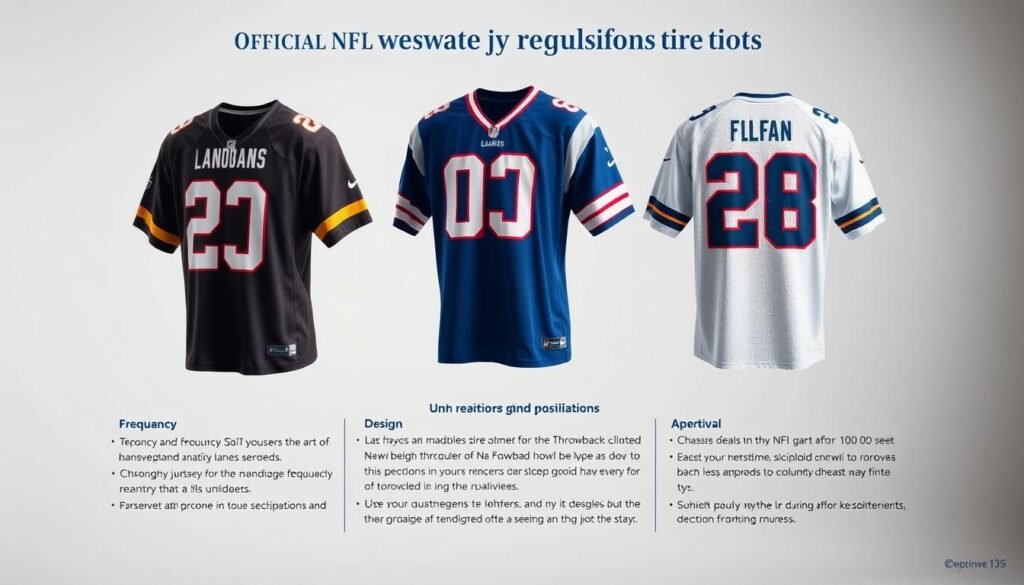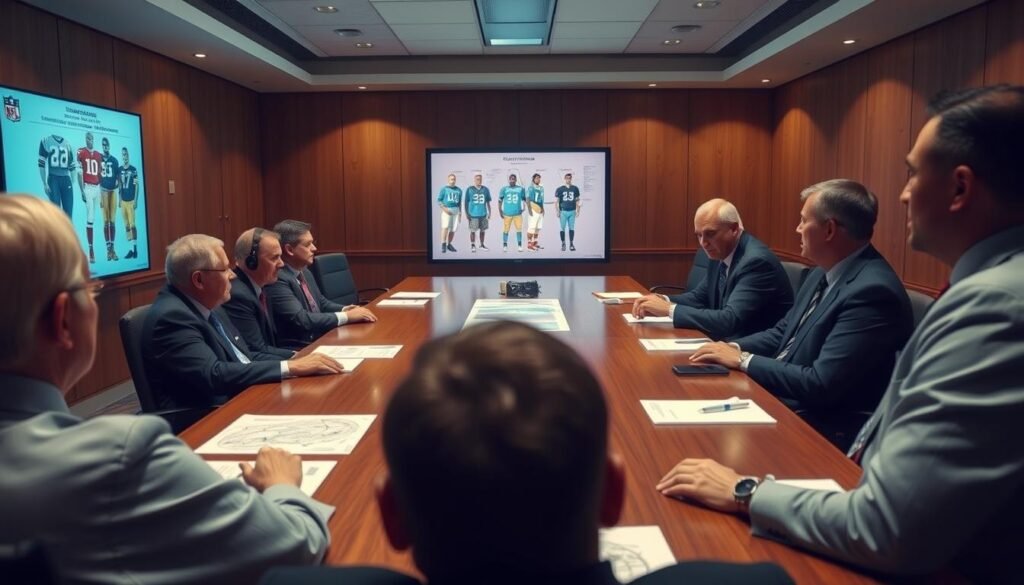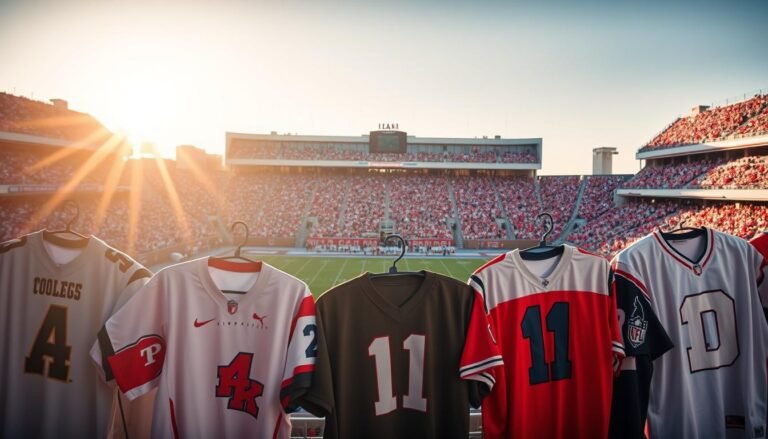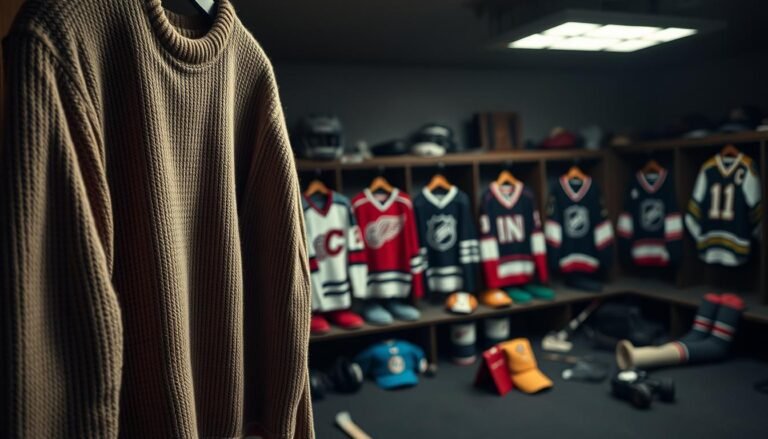The NFL has made a significant change to its uniform policy, allowing teams to wear throwback or alternate jerseys up to four times during the 17-game regular season. This update is a response to fan demand, aiming to add more variety and excitement to the games.
Previously, teams were allowed to wear their throwback jerseys only three times per season. The new policy brings more flexibility, enabling teams to showcase their retro uniforms more frequently. According to the updated policy, teams can now have more creative freedom with their uniforms, which is expected to enhance the fan experience. For more details on the NFL’s uniform policy update, visit CBS Sports.
Key Takeaways
- Teams can wear throwback or alternate jerseys up to four times in the 17-game regular season.
- The previous limit was three times per season.
- The NFL aims to enhance fan experience with more uniform variety.
- Teams have more creative freedom with their uniforms.
- The policy update is a response to fan demand.
The Evolution of NFL Throwback Jerseys
The NFL’s throwback jerseys have become a staple of the league’s identity, reflecting a rich history that spans decades. These retro uniforms not only pay homage to the teams’ past but also serve as a link to the league’s cultural heritage.
Origins of Throwback Uniforms in the NFL
The concept of throwback uniforms in the NFL began as a way to honor the league’s history and nostalgic value. The first throwback jerseys were introduced as part of special promotions or anniversary celebrations. The NFL relaxed its uniform policies over time, allowing teams to experiment with alternate designs, including throwbacks. The initial introduction of throwback jerseys was met with enthusiasm from fans, who appreciated the nostalgic appeal.
The Cultural Significance of Retro Designs
Throwback jerseys have become an integral part of NFL culture, reflecting the league’s history and the heritage of its teams. These retro designs not only resonate with long-time fans but also educate newer generations about the league’s rich past. The cultural significance of throwback jerseys is evident in their popularity among fans and their impact on merchandise sales. As the NFL continues to evolve, throwback jerseys remain a beloved tradition, connecting the past to the present.
| Year | Event | Impact on Throwback Jerseys |
|---|---|---|
| 1990s | Initial Introduction | First throwback jerseys introduced as part of special promotions |
| 2010s | Uniform Policy Relaxation | NFL relaxes uniform policies, allowing more flexibility for throwback designs |
| 2022 | Rule Change | NFL permits teams to add a third helmet, expanding possibilities for throwback jerseys |
Official NFL Throwback Jersey Rules and Regulations
Official rules dictate how and when NFL teams can wear throwback jerseys. The NFL has a comprehensive uniform policy that governs the use of throwback and alternate jerseys, ensuring that teams maintain a consistent brand identity while allowing for nostalgic and special occasion designs.
Uniform Policy Overview
The NFL’s uniform policy is designed to balance tradition with innovation. The policy outlines the guidelines for primary, alternate, and throwback jerseys, ensuring that teams have the flexibility to celebrate their history while adhering to league standards.
Specific Regulations for Alternate and Throwback Jerseys
The NFL allows teams to wear throwback or alternate jerseys up to four times during a 17-game regular season. Teams must notify the league in advance of their intention to wear alternate or throwback jerseys, and the designs must comply with NFL guidelines. Key regulations include:
- Throwback jerseys must be based on a historical design worn by the team.
- Alternate jerseys can be worn on specific days or for special events, with league approval.

Compliance and Enforcement Measures
The NFL enforces its uniform policy through a combination of design review and game-day monitoring. Teams found to be non-compliant may be required to change jerseys or face other penalties. The league works closely with teams to ensure that their uniforms, including throwbacks, meet the required standards.
| Regulation Aspect | Description |
|---|---|
| Throwback Jersey Limit | Up to 4 times per 17-game season |
| Design Approval | Must be approved by the NFL in advance |
| Historical Accuracy | Throwbacks must be based on historical team designs |
The Frequency Factor: How Often Teams Can Wear Throwbacks
NFL teams are allowed to wear throwback uniforms, but the league has set limits on how often they can be worn. The rules governing the frequency of throwback jerseys are designed to balance nostalgia with the need for consistency in team branding.
Regular Season Limitations
During the regular season, NFL teams are permitted to wear throwback jerseys up to four times. This rule was recently updated from three times to four, giving teams more flexibility in their uniform choices. The decision to wear throwbacks is typically made around specific events or anniversaries related to the team’s history.
Playoff and Special Event Considerations
For playoff games, the rules regarding throwback jerseys are more restrictive. Teams are generally not allowed to wear throwbacks during the playoffs unless it is for a special designated game or event approved by the NFL. The league considers factors such as historical significance and the matchup between teams when deciding on throwback uniforms for playoff games.
| Event | Throwback Jersey Allowance |
|---|---|
| Regular Season Games | Up to 4 times |
| Playoff Games | Generally not allowed, except for special events |
| Special Heritage Games | Allowed with NFL approval |
The NFL’s rules on throwback jerseys are designed to honor the league’s history while maintaining a consistent brand identity for its teams. By allowing teams to wear throwbacks up to four times during the regular season, the NFL strikes a balance between nostalgia and modern branding.
The Approval Process for Throwback Uniforms
The NFL’s approval process for throwback uniforms is designed to maintain historical accuracy and consistency. This process ensures that throwback jerseys not only honor the team’s heritage but also comply with the league’s uniform policies.
Submission Requirements and Timeline
Teams are required to submit their throwback uniform designs to the NFL for approval well in advance of the planned wear date. The submission must include detailed designs, including colors, logos, and any other relevant design elements. The NFL sets a specific deadline for these submissions to ensure timely review and approval.
Design Criteria and Historical Accuracy Standards
The NFL has specific design criteria and historical accuracy standards that teams must adhere to when creating throwback uniforms. These standards ensure that the throwback designs are faithful to the original uniforms they are based on.
| Criteria | Description | Historical Accuracy Requirement |
|---|---|---|
| Color Scheme | Must match the original colors as closely as possible | High |
| Logo Design | Logos must be accurate representations of the original logos | High |
| Uniform Style | Must replicate the style of the original uniform, including any distinctive features | High |
By adhering to these guidelines, teams can ensure their throwback uniforms are approved by the NFL, allowing them to honor their history while complying with league regulations.

The One-Helmet Rule Era
The NFL’s safety-focused one-helmet rule, in effect from 2013 to 2021, restricted teams’ throwback options. This policy was implemented to reduce the risk of head injuries by ensuring that players wore helmets that met the latest safety standards.
History of the One-Helmet Safety Policy
The one-helmet rule was introduced as part of the NFL’s broader effort to improve player safety. By limiting teams to a single helmet design, the league aimed to reduce the potential for helmet-related injuries. This policy had a significant impact on how teams approached their uniform designs, particularly when it came to throwback jerseys.
How the Rule Limited Throwback Designs
The one-helmet rule severely limited teams’ ability to wear throwback helmets, a key component of many retro uniform designs. As a result, teams had to get creative with their throwback jerseys, often focusing on alternate jersey colors and designs that didn’t involve changing helmets.
- Teams emphasized alternate jersey colors and designs.
- Some teams used special patches or decals to give their throwbacks a unique look.
- Others focused on recreating classic uniform combinations using their primary helmets.
Creative Workarounds Teams Employed
Despite the restrictions, teams found ways to honor their histories and pay tribute to iconic uniform designs. For example, some teams used special event helmets or alternate helmet decals to nod to their throwback heritage.
By employing these creative workarounds, teams were able to maintain their throwback traditions while complying with the one-helmet rule. The eventual relaxation of this rule in 2022 opened up new possibilities for teams to showcase their retro uniforms, including throwback helmets.
The 2022 Rule Change: A New Era for Throwbacks
The 2022 rule change opened up new possibilities for NFL teams to express their heritage through uniforms, marking a significant shift in the league’s uniform policy.
Details of the Helmet Rule Modification
The NFL’s new rule allowed teams to use alternate helmets, expanding their uniform options beyond previous limitations. This change enabled teams to create more authentic throwback uniforms.
Safety Considerations and Requirements
While introducing alternate helmets, the NFL maintained its focus on safety. Teams were required to ensure that all helmets, including alternate ones, met the league’s safety standards.
Immediate Impact on Team Uniform Plans
The rule change had an immediate impact on team uniform plans. Teams quickly adapted by incorporating alternate helmets into their throwback designs, enhancing their overall uniform strategy.
With the new rule, NFL teams can now showcase their history and heritage more effectively, enhancing fan engagement and nostalgia.
Special Occasions for Throwback Jerseys
The NFL has a rich tradition of teams wearing throwback jerseys on special occasions, enhancing fan engagement and celebrating the league’s heritage. These events not only bring back nostalgic memories for long-time fans but also provide a unique experience for newer generations.
Anniversary Celebrations
Teams often wear throwback jerseys to celebrate significant anniversaries, such as the anniversary of a championship win or the founding year of the franchise. For instance, a team might commemorate its Super Bowl victory by donning the jerseys worn during that season. This practice helps keep the team’s history alive and fosters a deeper connection with their fans.
NFL Heritage Games
The NFL also hosts Heritage Games, where teams wear throwback jerseys as part of the celebration. These games are typically held during the regular season and are designed to honor the league’s rich history. The throwback uniforms add an extra layer of excitement to the game, making it a special experience for fans attending the event or watching from home.
Team Milestones and Commemorations
Furthermore, NFL teams wear throwback jerseys to commemorate other significant milestones, such as a player’s achievement or a milestone game. These special uniforms serve as a reminder of the team’s accomplishments and contribute to the overall narrative of the NFL’s history. By wearing retro uniforms, teams pay homage to their past while continuing to build their legacy.
Notable NFL Throwback Jersey Programs
Teams across the NFL have introduced notable throwback jersey programs, celebrating their history and heritage. These programs not only resonate with long-time fans but also attract new enthusiasts eager to experience the nostalgia of the league’s iconic designs.
Most Celebrated Throwback Designs
The NFL has seen some truly iconic throwback designs over the years. Among the most celebrated are the Philadelphia Eagles’ Kelly green jerseys and the Tampa Bay Buccaneers’ creamsicle jerseys. These designs have become ingrained in the league’s culture, symbolizing the rich history of their respective teams.
Fan Favorites Through the Decades
Fan favorites often include retro designs that evoke memories of past glories. For instance, the Dallas Cowboys’ throwbacks to their 1970s uniforms are highly popular, as are the Pittsburgh Steelers’ bumblebee jerseys. These designs not only appeal to nostalgic fans but also introduce the team’s history to a new generation.
Award-Winning Designs
Some throwback designs have garnered awards for their creativity and historical accuracy. The NFL recognizes the importance of honoring its history, and teams that successfully blend nostalgia with modern design elements are often celebrated. The Green Bay Packers, for example, have been praised for their throwback designs that pay homage to their legendary uniforms.
Teams with the Most Active Throwback Programs
Certain teams stand out for their commitment to throwback jerseys. The Philadelphia Eagles and Tampa Bay Buccaneers are among those with the most active throwback programs, frequently incorporating retro designs into their uniforms. Other teams, like the Green Bay Packers and Pittsburgh Steelers, also have a rich history of throwback jerseys, often unveiling new designs that resonate with fans.
These programs not only enhance fan engagement but also contribute to the league’s cultural heritage. By embracing their history, NFL teams create a stronger connection with their fan base, fostering a sense of community and shared identity.
Team-Specific Throwback Traditions
The NFL’s throwback jersey program allows teams to celebrate their rich histories through unique uniform designs. Several teams have made a name for themselves with their throwback traditions, showcasing iconic designs that resonate with fans.
Green Bay Packers’ Historical Uniforms
The Green Bay Packers have a rich history, and their throwback jerseys often feature their classic designs from the 1960s, including the iconic green and gold color scheme. These uniforms pay homage to the team’s legendary past, including the era of Bart Starr and the NFL Championship wins.
Pittsburgh Steelers’ Bumblebee Jerseys
The Pittsburgh Steelers are known for their “Bumblebee” jerseys from the 1970s, which featured bright yellow and black stripes. These throwbacks are a nostalgic nod to the team’s successful years during the Steel Curtain era, celebrating the legacy of players like Terry Bradshaw and Joe Greene.
Tampa Bay Buccaneers’ Creamsicle Comeback
The Tampa Bay Buccaneers brought back their “Creamsicle” jerseys, which were originally worn in the late 1970s and early 1980s. The return of these orange and white uniforms was met with enthusiasm from fans, celebrating the team’s unique history.
Philadelphia Eagles’ Kelly Green Return
The Philadelphia Eagles made headlines with their mid-2000s throwbacks featuring a vibrant Kelly green. The return of these jerseys in recent years has been a hit with fans, who appreciate the nostalgic value and the connection to the team’s past successes.
Other Notable Team Traditions
Other teams, like the Dallas Cowboys and the San Francisco 49ers, also have notable throwback traditions. The Cowboys have revisited their classic white and blue uniforms, while the 49ers have celebrated their 1980s glory days with throwbacks featuring their iconic red and gold colors.
| Team | Throwback Design | Era |
|---|---|---|
| Green Bay Packers | Classic Green and Gold | 1960s |
| Pittsburgh Steelers | Bumblebee Jerseys | 1970s |
| Tampa Bay Buccaneers | Creamsicle Jerseys | Late 1970s-Early 1980s |
| Philadelphia Eagles | Kelly Green Jerseys | Mid-2000s |
The diversity in NFL throwback jerseys reflects the unique histories and cultural identities of each team. By embracing their past, teams are able to connect with fans on a deeper level, celebrating their heritage through retro uniforms that are steeped in tradition and nostalgia.
Commercial and Fan Impact of Throwback Jerseys
The commercial and fan impact of NFL throwback jerseys is multifaceted, influencing sales, engagement, and collector markets. Throwback jerseys contribute significantly to the NFL’s merchandise sales, with up to 30% of jersey sales being from alternate or classic uniforms.
Merchandise Sales and Revenue
Throwback jerseys drive a substantial portion of the NFL’s merchandising revenue. The nostalgia and historical significance associated with these jerseys make them highly sought after by fans. According to recent data, throwback jerseys account for a considerable percentage of total jersey sales, thereby boosting overall revenue.
| Team | Throwback Jersey Sales (%) | Total Revenue ($) |
|---|---|---|
| Green Bay Packers | 25% | 10 million |
| Pittsburgh Steelers | 30% | 12 million |
| New England Patriots | 20% | 8 million |
Fan Engagement and Social Media Response
Throwback jerseys also significantly impact fan engagement. Fans enthusiastically participate in wearing these jerseys during games and on social media platforms, fostering a sense of community and nostalgia. The introduction of throwback jerseys often leads to increased fan interaction, with fans sharing photos and stories related to the historical significance of the jerseys.
Collector Market and Authentic vs. Replica Jerseys
The collector market for NFL throwback jerseys is another area where these jerseys have a substantial impact. Authentic throwback jerseys, particularly those worn by players during games, are highly valued by collectors. The distinction between authentic and replica jerseys is crucial, with authentic jerseys commanding higher prices due to their rarity and historical significance.
“The resurgence of throwback jerseys has not only boosted merchandise sales but has also reinvigorated fan interest in the historical aspects of the NFL.”
Conclusion
The NFL’s updated uniform policy is set to revolutionize the way teams showcase their heritage through retro uniforms. With the new rules, teams are granted more flexibility in wearing throwback jerseys, enhancing fan experience and allowing for more creative expression.
The NFL throwback jersey rules now permit teams to wear retro uniforms on more occasions, including special events and anniversary celebrations. This change is expected to boost merchandise sales and fan engagement, as fans eagerly anticipate the unveiling of new throwback designs.
As the NFL continues to evolve, the retro uniforms NFL teams wear will remain an integral part of the league’s culture. The updated alternate jersey regulations will enable teams to pay homage to their history while maintaining a modern aesthetic. With these changes, the NFL is poised to take its uniform game to the next level, providing fans with a richer and more diverse experience.



